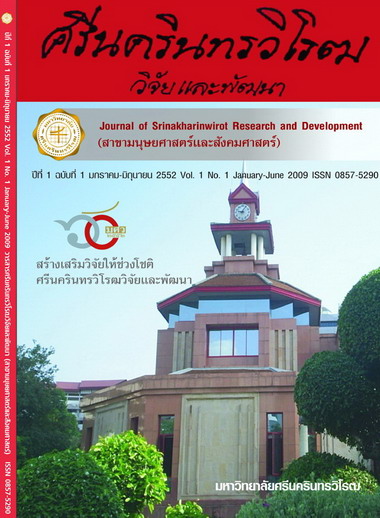คุณลักษณะและกระบวนการปลูกฝังคุณธรรมจริยธรรมของประเทศเกาหลี (Korea’s Moral and Ethical Qualities: Characteristics and Instilling Processes)
Keywords:
Korea, Characteristics, Processes, Instilling, Moral, EthicalAbstract
บทคัดย่อประเทศเกาหลีมีวัฒนธรรมที่สืบทอดกว่า 5,000 ปี สามารถดำรงความเป็นชาติที่เข้มแข็งมาระยะหนึ่ง จากนั้นก็ถูกรุกรานตกเป็นเมืองขึ้นของญี่ปุ่นจนถึงสงครามโลกครั้งที่ 2 เมื่อสงครามโลกสงบลง ญี่ปุ่นแพ้สงคราม เกาหลีได้รับเอกราช แต่เกาหลีก็ตกอยู่ในภาวะสงครามการแบ่งค่ายของโลกในสมัยนั้น คือค่ายประชาธิปไตยอันมีประเทศสหรัฐอเมริกาเป็นผู้นำ และค่ายคอมมิวนิสต์อันมีประเทศสหภาพโซเวียตเป็นผู้นำ สงครามครั้งนั้นเป็นสงครามระหว่างชนชาติเดียวกันที่แตกต่างทางด้านแนวคิด เป็นสงครามที่ยาวนาน เมื่อมีการเจรจาสงบศึกเกาหลีก็ถูกแบ่งแยกออกเป็น 2 ประเทศ คือ ประเทศสาธารณรัฐประชาธิปไตยประชาชนเกาหลี และประเทศสาธารณรัฐเกาหลี โดยมีเส้นขนานที่ 38 องศาเหนือ เป็นเส้นแบ่งพรมแดน เมื่อสงครามสงบประเทศสาธารณรัฐเกาหลีได้เร่งนโยบายที่สำคัญ 3 ประการ อันเป็นรากฐานรากแก้วของประเทศ คือ
1. นโยบายการปฏิรูปการศึกษา เพื่อสร้างและพัฒนาทรัพยากรมนุษย์ให้เป็นทรัพยากรที่มีคุณค่าและมีประสิทธิภาพ การปฏิรูประบบการศึกษาเริ่มจาก การสร้างแรงจูงใจให้ครูด้วยเงินเดือนที่สูงขึ้น กำหนดสัดส่วนระหว่างครูกับนักเรียนให้สมดุล รัฐจัดการศึกษาแบบให้เปล่า แจกตำราเรียน เลี้ยงอาหารกลางวันแก่นักเรียนทุกคน มาตรฐานการเรียนการสอนทั้งในเมืองและในชนบทไม่มีความแตกต่างกัน และยกเลิกการสอบแข่งขันเพื่อเข้าเรียนในระดับมัธยมศึกษา
2. นโยบายทางด้านเศรษฐกิจ เน้นให้ประชาชนทุกคนทุกวัยประหยัดและอดออม ก่อให้เกิดอัตราการออมทรัพย์ในประเทศเพิ่มสูงขึ้นอย่างรวดเร็วและมั่นคง การแก้ปัญหาชาวชนบทอพยพเข้าเมืองเพื่อหางานทำ ปัญหานี้แก้หมดไปด้วยการที่รัฐบาลเริ่มโครงการแซมาอึลวุนดง ปรัชญาของโครงการนี้ คือ "ความขยัน หมั่นเพียร การช่วยตนเอง และความร่วมมือ"
3. นโยบายการปลูกฝังคุณธรรมจริยธรรม เริ่มจากการปลูกฝังคุณธรรมจริยธรรมในครอบครัวตามปรัชญาขงจื้อ และปลูกฝังคุณธรรมจริยธรรมในโรงเรียนโดยสร้างหลักสูตรการสอนคุณธรรมจริยธรรมอย่างชัดเจน
Abstract
Korea has enjoyed its cultural heritage for over 5,000 years. It had been an independent nation for a long time before it was invaded and colonized by Japan until the end of World War II. Because of Japan's defeat in World War II, Korea was liberated. However, afterwards, it was engaged in a war dividing the country into two: the democratic part led by the USA and the communist part by the Soviet Union. After the war, there was a treaty of peace which has divided the country at the 38th parallel north into two countries: the People's Republic of Korea and the Republic of Korea. The Republic of Korea has developed three urgent policies to form the main foundation for the country.
1. The educational reform aims at creating and developing human resources to be resourceful and efficient. The educational reform began with the teacher's incentive by giving the teacher a high salary, with an appropriate ratio between a teacher and students. The government fully supports free education for all students, with free learning materials and lunch. In terms of educational standard, there is no difference between the urban and rural schools. Entrance exams to secondary schools have been waived.
2. The economic policy places emphasis on saving by encouraging people of all walks of life and all ages to save up. With the policy, the domestic saving has increased rapidly and substantially. Furthermore, to address the problem of rural people migrating into the urban area for work, the government started the Sae Ma Ul Woon Dong project, the philosophy of which is "Diligence, Self Dependence and Cooperation."
3. The policy to instill moral and ethical qualities is started in the family after the Confucius philosophy. In the school, moral and ethics are instilled through a curriculum teaching explicit moral and ethics.
Downloads
Downloads
Published
How to Cite
Issue
Section
License
Srinakharinwirot Research and Development Journal of Humanities and Social Sciences is licensed Under a Creative Commons Attribution-NonCommercial-NoDerivs 4.0 International (CC-BY-NC-ND 4.0) License, Unless Otherwise Stated. Please Read Journal Policies Page for More Information on Open Access, Copyright and Permissions.



